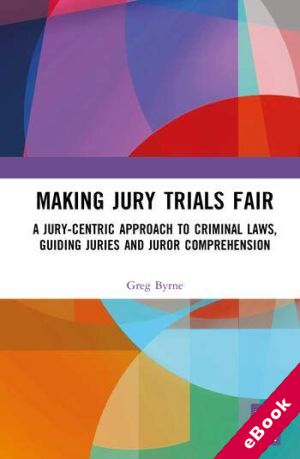
The device(s) you use to access the eBook content must be authorized with an Adobe ID before you download the product otherwise it will fail to register correctly.
For further information see https://www.wildy.com/ebook-formats
Once the order is confirmed an automated e-mail will be sent to you to allow you to download the eBook.
All eBooks are supplied firm sale and cannot be returned. If you believe there is a fault with your eBook then contact us on ebooks@wildy.com and we will help in resolving the issue. This does not affect your statutory rights.
This book proposes using a ‘jury-centric approach’ for improving laws, practices, and procedures in jury trials. Courts assume that jurors in a criminal trial understand and apply the judge’s directions about the law. This assumption is based on jury verdicts and the courts’ observations of jurors and inferences about juror comprehension. Research reveals that the courts’ assumption about juror comprehension is fundamentally flawed. Addressing this problem is essential for fair trials.
A jury-centric approach is evidence-informed and works within a fair trial framework. It asks what jurors need to understand the issues that they must determine. It also examines juror comprehension research and why judges and lawyers have often been sceptical about this research. The book illustrates and evaluates a jury-centric approach through three case studies involving structured decision-making aids, homicide laws, and misconceptions in sexual offence cases. The book proposes establishing an interdisciplinary Juries Advisory Council, drawing on judicial and legal expertise as well as expertise in jury research. The jury’s task is increasingly complicated. Reform is essential to help jurors understand their task and determine the issues on their legal and factual merits.
The book will be a valuable resource for academics, researchers, policy-makers and students in the areas of Criminal Law, Courts, Human Rights Law, Psycholinguistics and Organisational Psychology, and to judges and lawyers.